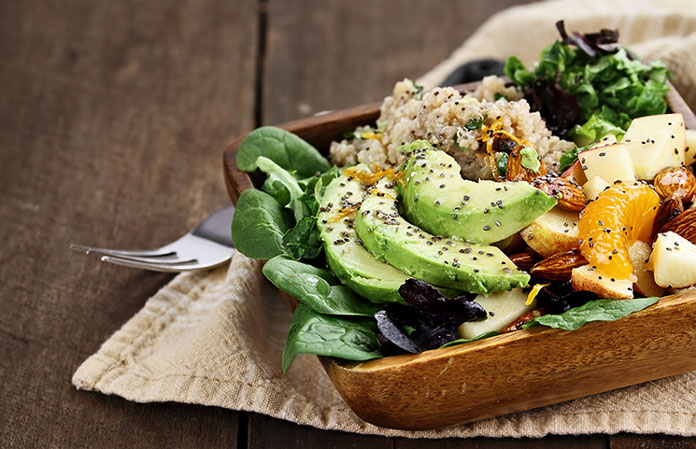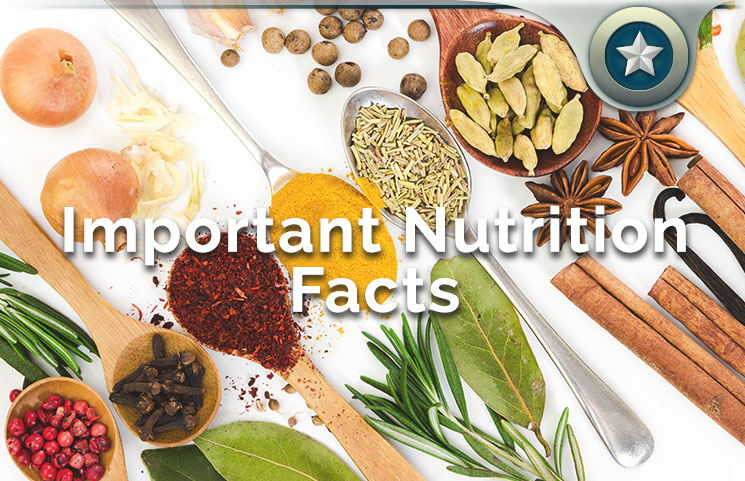With loads of conflicting advice about eating healthy and losing weight, it is easy for anyone to become confused and just give up. A good example of this is white bread.
A few years ago, some “health experts” suggested bread might be bad for you. Recently, on the Dr. Oz show, some other “health experts” claim that bread is good for you. So, the question is which do we believe?
Important Nutrition Information You May Not Know
Table of Contents
Which health and nutrition advice should you follow to eat healthy, shed some weight or manage your current weight? It’s with this in mind that we created this nutrition facts article.
We hope to clear the air with scientific evidence, thus allowing you to fulfill your dream of staying healthy.
1. Natural Doesn’t Necessary Mean Healthy
Most people assume that natural foods are healthy and good for you. And this is true to some extent, seeing as some of them are actually nutritious and great for your health.
However, the real problem is in their labels. Just because a food product is labeled as natural doesn’t mean that it is good for you. This is because some of these foods can sometimes contain more calories and sugar.
A good example of this is the agave nectar syrup, which is sold as a natural sweetener, and an alternative to refined sugar and corn syrup. Studies like this and this have actually proven this claim to be untrue, as it has been shown to actually contain more fructose than corn syrup and refined sugar.
Bottom line, don’t believe all the “natural” food or substance claims on nutrition labels. Verify these claims and ascertain that they are truly natural and beneficial to your health before taking them.

2. Protein Consumption Increases Your Chances of Losing Weight
Fitness experts routinely recommend increased protein intake and fewer carbs when you’re looking to lose weight. That’s because protein plays a pretty significant role in weight loss and muscle mass building.
Unfortunately, there are some erroneous claims that proteins can help you gain weight. This is so untrue. If anything, it is extremely effective at increasing your rate of metabolism, so your fat burn rate becomes higher, while it also doubles as an appetite suppressant too.
This is why when you take a lot of protein, you’re not likely to feel the fake hunger that you often get after eating carbs – refined carbs in particular. As a result of this, you’ll end up eating far less than you would, whilst torching the calories (about one hundred calories daily) and fat your already have stored away.
You can see this research, this one and this one for more proof of protein’s ability to help you lose weight and burn fat. This is why if you’re looking to lose weight, you might want to start with a dieting regimen that’s very rich in protein and contains moderate or low amounts of carbs.
Studies have shown that you can effectively lower your calorific intake to no more than 450 per day by simply getting more protein in your diet. At this rate, you’ll lose roughly one pound weekly or 4lbs monthly from doing nothing else but adopting a high protein diet.
Then, there’s the added benefits of it boosting your immune system and reducing your risk of developing conditions such as osteoporosis. It may also play a role in reducing stress, improving sleep and rest, as well as soothing your nerves.
3. Nutrition Details On Labels Aren’t Always Accurate
It’s always smart to read and pay attention to the nutritional labels on food boxes. This way, consumers know exactly what they are getting even before opening the pack. Unfortunately, this information isn’t often completely true.
There are a few instances where the manufacturers or producers of such food items either left out vital information about certain ingredients or downplayed its concentrations/amounts. Whatever the reasons behind this non-disclosure or partial disclosure, the reality is that it can somewhat affect you, the consumer.
You should always take product descriptions with a pinch of salt as they are often cleverly worded to give certain impressions, and make you believe the products are actually healthy. A good example of this is breakfast cereals with the whole grain designation.
Most of the time, people assume that whole grain cereals contain little or no sugar –after all, the point of buying an often more expensive whole grain cereal is to get the added benefits of fiber and little or no sugars. Yet, studies have shown some of these cereals to have significant quantities of sugar in them.
The reality is that many products often emphasize the a few features that they know will appeal to its consumers, whilst downplaying the unfavorable qualities. So, pay attention to your food labels and verify that the ingredients are truly accurate.
No matter how great the product seems, always pay attention to the downplayed ingredients. It doesn’t make sense to have a whole grain cereal that’s full of sugars. Sure, you may benefit from the fibers, but what’s the point of that if the sugars are bound to do some damage to your body, particularly after prolonged consumption.
4. Low Fat Foods May Be Dangerous
The recent health craze has been the adoption of fat-free and low-fat foods like low-fat milk, low-fat yoghurts, zero milk and so on.
Some health experts are advocating the ingestion of these low-fat substances because they feel these products are healthier than alternatives with somewhat higher fat concentrations.
While there are some good benefits to taking these foods and drinks – seeing as they tend sometimes contain pretty decent amounts of highly necessary food nutrients- there’s also the attendant risks associated with taking them.
You see, fat adds flavor to foods and drinks. So, when they are extracted and removed, all that’s left is a pretty bland tasting product. So, manufacturers tend to compensate for this deficit by adding artificial flavors and loads of sugar.
The final product therefore, is one with low fat content, but high amounts of sugars and chemicals. As a result, even though you get to take little or no fat, you’re still doing serious damage to your health because of the sizable amounts of chemicals and sugar in those foods and drinks.
So, what’s the alternative? Just eat foods with moderate amounts of unsaturated fatty acids. These are often very nutritious and beneficial to your health, compared to the low-fat, sugar filled alternatives which are dangerous and bad for your health.

5. Carbs May Not Necessarily Make You Fat
For people looking lose weight, maintain their weight or prevent weight gain, carbs are considered the ultimate enemy. And for good reason. You see, carbohydrates consumed in huge quantities will cause excess fat storage, resulting in weight gain, obesity, insulin resistance, diabetes and metabolic syndrome.
This is why fitness experts often advocate low-carb diets for those looking to lose weight. While this is true to some extent, you need to understand that carbohydrates as a whole are not necessarily the “bad guy” here.
The types of carbohydrates are the real issue. Studies have shown that the right carbs can actually help you lose weight when taken in the right quantities. To prove this, take a look at the predominantly thin Asian population with their small/slight frames/builds and the Italian population with their lanky/slim builds.
You’ll find that white rice, ramen, spaghetti, macaroni and all sorts of carbs are a daily staple. Yet, most of their population don’t seem to gain any weight or become fat from the consumption of these foods.
Interestingly, obesity wasn’t a problem in the United States until the 80’s. Why is that? It’s simply because the US and the world started eating more processed carbohydrates, and in huge quantities.
Of course when the hammer came down on the processed foods, all other natural sources of carbs became collateral damage. If you want to lose weight and need help with your diet, simply cut out all processed carbs and replace them with more whole grain, high fiber carbs.
6. Eat More Real and Whole Foods
We get it, junk foods are convenient, time saving and taste great. But at what cost to your body and health? The obesity epidemic and its attendant repercussions have become widespread because of the excessive consumption of junk foods and drinks.
The average American takes 5-10 times more sugar, carbohydrates and calories than is healthy for them daily. Combine this with a largely sedentary lifestyle and you have a massively obese population.
Studies have shown that approximately 1 in 2 Americans are obese, another 3 out of 5 overweight, and about 6 out of 10 prediabetic. All because of the consumption of junk and unhealthy foods.
The simple solution to this is eating right. And this you can do by simply eating less processed foods and more whole, organic and natural foods. It’s really that simple. Eat everything that’s natural and still in its original form when it was harvested from nature.
The more modified it is, the less healthy it most likely is. This is why you should visit your local farmer’s market more or even start your own garden if you have the time and yard. If your foods contain lots of chemical ingredients and compounds, chances are they are processed to some degree.
Adopt healthier eating habits too. It’s easy to grab a big mac, pizza or hotdog when you’re hungry and on the go. But these aren’t healthy for you. If you don’t have the time to cook, locate good restaurants that sell real food and get your meals from there.
Thanks to Google, you can quickly locate restaurants close to you, view their menu and decide on which on you want. Even better, some of these restaurants can deliver to your home or office. You really don’t have to keep eating junk because they are convenient. Real foods are now more readily available and convenient.
Not only are they rich in nutrients and often delicious, they are healthy and can even help you lose weight if that’s your goal. In fact, people who eat real food tend to have less weight problems because real food is very filling and typically takes longer to digest, thus eliminating the need for in-between meal snacking.

7. The Best Dieting Program Is The Most Convenient One for You
We believe that the best dieting program is one that doesn’t require any drastic lifestyle change. Most people quit on their dieting programs because the demands are too rigorous or it gets in the way of their regular daily activities.
This is why we don’t advocate that you choose just one diet. Find one or a combination that works and modify it to your situation. Ultimately, you need to find meals and foods that don’t take up too much of your time to make and one that fits within your budget.
If you’re in doubt about where to start, think high protein, low carb, high veggies and fruits meals. Cut out the dairy, and refined sugar. Thankfully, there are both animal and plant protein sources, whole grains for your carbs and a ton of affordable fruits and vegetables.
So, the ultimate formula for your meals should be as follows:
8. 45% Protein + 15% Whole Grain Carbs + 20% Fruits +20% Veggies.
Of course, this formula isn’t set in stone. It’s a yardstick for you to follow if you want to start eating healthy. However, if you stick with this formula, you will not only end up being incredibly healthy, you will melt off the fat, live longer, have more energy, experience a greater sense of well-being, have radiant glowing skin, and shave off years from your looks.
Finally, remember that refined oils may cause heart disease, refined sugars can kill you, excessive alcohol intake can cause severe kidney and liver damage, and a sedentary life can shorten your life by 5-10 years.
Important Nutrition Facts Conclusion!
So, minimize your refined oil intake, get rid of refined sugar and use natural sweeteners like hone and stevia instead. Stop drinking excessively.
If you can’t, cut out the beer and start drinking wines. Then get active for at least 30-45mins every day. Take more walks, run, lift weight… whatever it is you have to do to get your heart rate up, do it.









